Why you should watch “Letters from Iwo Jima” by Clint Eastwood

Creative Commons via Wikipedia
October 5, 2022
The times I get emotional during movies and TV shows are quite rare. The last time I cried watching something was Disney’s Enchanted by Kevin Lima, and that wasn’t even a sad or tragic film. In fact, the ending was simply very heartwarming!
It’s tough for entertainment to elicit strong emotions for me if any. But the shows and films that do hit me in the feels are clearly great to me. That’s what the best films really are, films that strike emotionally in some way or become personal for the viewer. So what would you think are my thoughts on Letters From Iwo Jima by Clint Eastwood, if I told you that I screamed incredibly loud during the film?
Letters From Iwo Jima depicts the Battle of Iwo Jima during World War 2 from the Japanese perspective. All the way back in 2006, Clint Eastwood not only cast Japanese actors to play Japanese characters but even made almost all of the dialogue in the Japanese language.
The film’s faithfulness to Japanese culture and history earned it positive reception in Japan itself. The film both humanizes the Japanese soldiers Americans fought against while also painting a dark, grim portrait of what soldiers experience in war.
When I say that the film makes war look dark and grim, the film is quite literally dark and grim. To make war seem as bleak as possible, the film is so devoid of color you’d think it was filmed in black and white. And when enough blood spills from soldiers to fill a bathtub, the blacks and greys make the red blood stand out even more.
The amount of human — and animal — lives that are taken reveals the great lengths people will go to during the war. The Japanese military in this film does absolutely anything to win, even if it curtails people’s freedom.
Eastwood also picks the harshest landscapes for shooting, giving the conflict an unflattering look.
We all like learning about different cultures. Although Letters From Iwo
Jima was far less popular in the United States than it was in Japan, the film teaches Americans about a side of World War 2 that’s seldom discussed.
The film portrays the humanity of soldiers, reminding any hawks that soldiers are more than just geopolitical chess pieces.
Two of the main characters, Saigo and General Tadamichi Kuribayashi, write letters to their loved ones back home, tying the battlefront to the home front. In one scene, Saigo is drafted. His pregnant wife, Hanako, pleads to those drafting Saigo that the two only have each other. A woman remarks that Saigo and Hanako at least have a child to carry on their name and that everyone else has sent their husbands and sons to war. While eating, Hanako fears that Saigo may die. Saigo huddles over to Hanako and crouches down. He asks their baby, “Can you hear me? It’s dad.”
Soldiers are more than soldiers. They are people, parents, siblings, and lovers.
If you have two hours and 20 minutes to spare, watch Letters From Iwo Jima and feast your eyes on a great cinematic experience. You won’t regret it.






